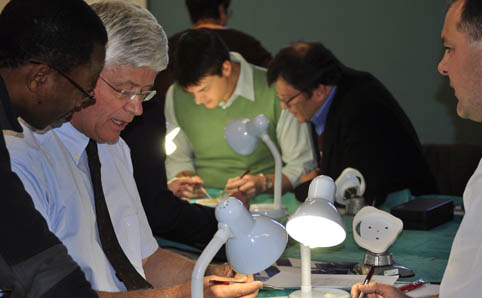 |
| Left to right, Dr S.M Mogaladi from Pretoria, Dr Paul Sergeant, Chairperson of the International Cooperation Committee of the European Association of Cardiothoracic Surgery ( also immediate past president of EACTS) and Dr Richard Schulenburg from our university. |
Our Faculty of Health Sciences hosted the European Association for Cardiothoracic Surgeons Academy (EACTS) and Hannes Meyer Cardiothoracic Surgery Registrar Symposium, from 3 to 5 June 2011.
The focus of this year’s symposium was new techniques in perfusion and surgery, with specific emphasis on research methodology, inflammatory lung disease and cardiac surgery in children and adults, which can be performed without the aid of a heart-lung machine in developing countries.
The symposium was attended by approximately 70 delegates from cardiothoracic units from across South Africa and 10 doctors from 6 African countries, as well as 30 perfusion technologists.
Several international visitors were present, like Prof. Paul Sergeant and Prof. Marko Turina, two previous EACTS presidents and Prof. Charles Yankah, a Ghanaian Cardiothoracic Surgeon from the Charite Medical University in Berlin. The current president of the European Board of Cardiovascular Perfusion (EBCP), Mr Frank Merkle, was also one of three international speakers delivering lectures on perfusion technology.